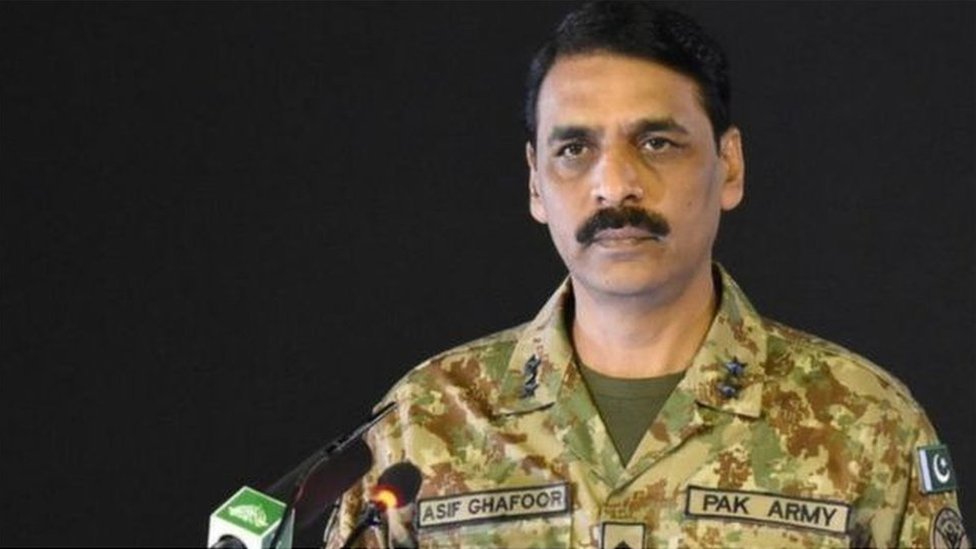DG ISPR, Major General Asif Ghafoor recently delivered a speech highlighting a few outstanding issues; these included Pak-India relations, talks with Afghanistan, concerns regarding social media, and the Pashtun Tahafuz Movement (PTM). https://www.facebook.com/dawndotcom/videos/10160559132975442/
Here is a quick summary of the major points made in his speech.
1) Pak-India Relations
He started off with mentioning the ceasefire agreement with India; “We respect the ceasefire and will not respond to the first bullet from India directed at us, but we will be forced to retaliate if civilians are targeted next.” He went on to say that “peace should not be taken as a sign of weakness”.

2) Peace in Afghanistan
The army spokesperson claimed that there had been a meeting between Afghanistan’s new National Security Advisor and Pakistan’s Army Chief. According to him, it had been a “positive discussion”. It was said that both sides are “indispensable for each other geographically”. On the question of peace, the general claimed: “no one wants peace in Afghanistan more than Pakistan does”. And that is perhaps the truest desire of our people, since the Durand Line makes us vulnerable to each other’s political instabilities.

3) Talks With PTM Representatives
General Ghafoor highlighted the fact that he met with PTM members Manzoor Pashteen and Mohsin Dawar: “I took both of them to my office to meet with GOCs and IGFCs to discuss their issues.” These problems he claimed were “functional” ones and included the matter of missing persons in FATA, the case of Naqeebullah Mehsud, and check-post issues. He went on to say that Mohsin Dawar had even later sent him a thank you text for “facilitating” them, saying that the issues had been solved.

The General then went on to mention the wave of protest that had started up, even though, according to him, the “issues had been solved”: “I don’t know how all this happened.”
4) The Social Media Uproar
He singled out and thanked local media for tactfully ignoring the situation and not reporting on it. He then directly singled out the people taking part in protests, saying that there is “a need to look inside and see if what you are doing is good or bad for the country” when outside forces who are “not happy with Pakistan’s stability” begin supporting your cause.

5) The Need To Monitor Social Media
He also highlighted the fact that it is after all the “responsibility” of the army and ISI to monitor what is being said on social media. He even suggested there is a “need to destroy” opposition on social media. This is strong wording on his part and ignores the fact that individuals have a right to speak their minds.

6) Missing Persons
The general presented the issue as a natural consequence of war, saying war is “cruel” and “not a fair game”: “There will be some deficiencies in the operations; angels are not conducting them. Accordingly, sacrifices have to be made by the nation, the armed forces, and the locals.”

It is unfortunate that war is a ‘game’ being played still and that so many people must be enveloped by it.
7) Asad Durrani’s Book
Towards the end of his talk, he referred to the book written by retired ISI chief Lieutenant General Asad Durrani in collaboration with former RAW chief A.S Dulat, titled “The Spy Chronicles: RAW, ISI and the Illusion of Peace”. Many had an issue with the politically sensitive topics discussed in the book, due to which an inquiry had been ordered. The DG ISPR pointed out that “whichever incidences that he spoke of took place after his retirement”. Therefore it was not the “firsthand experience of those incidents”, rather only “conjecturing” on his part.

More importantly, he also stressed that Durrani had not been given a No Objection Certificate (NOC) for the publication of this book. While clarifying the stance of the army on certain subjects, the DG ISPR did not acknowledge in detail the fact that the grievances being aired on social media are in fact very real concerns for the people. Perhaps a less vague and more empathetic agenda needs to be set out in relation to these concerns.

